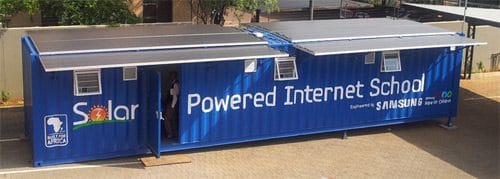Last week I read the article Yoza Cellphone Stories – getting South African teenagers reading on the website of Unesco and I already could imagine my students reactions and unbelief when I would tell them that from now on we will use mobile phones for reading. Though, I’m pretty sure that they would love the mobiles for literacy-project, launched by the Nokia-UNESCO partnership.
As many developing countries, Africa is a “book-poor and mobile phone-rich” society. Steve Vosloo, founder of the mobiles for literacy-project, mentions on the blog Educational Technology Debate that 51% of households in South Africa don’t have a single book at home, while only 6% of households own 40 books or more. And – even more surprising – only 7% of schools have functioning libraries. While books are scarce, 90% of South Africa’s teenagers have their own cell phone and 70% of these phones have access to the internet. This makes the mobile phone an interesting tool to work on literacy.
The mobiles for literacy project
The m4Lit (mobiles for literacy) project was launched as an experiment to see if teenagers in South Africa would read on their mobile phone. One of the inspirations for the project was the m-novel phenomenon in Japan, where teenagers have been reading and writing novels on their mobile phones since almost 10 years now. But the success in Japan didn’t guarantee success in Africa. So, in a pilot phase two stories, called Kontax, were published on a mobisite and on MXit (Africa’s largest social network) in a period of almost a year (September 2009 and May 2010), both in English and in isiXhosa. The reading even was made interactive, since it was possible for the teens to discuss the plot, the reactions of the characters, … They could also vote in polls and leave comments, and in the end it was even possible to write a piece as part of a writing competition. The African youth was excited! The website of the project gives us the following facts:
In just seven months the two stories were read over 34,000 times on mobile phones. To put this in context, a book is considered a best seller in South Africa if 3,000 copies are sold. Over 4,000 entries were received in the writing competitions and over 4,000 comments were left by readers on individual chapters. Many of the readers asked for more stories and indifferent genres.
Encouraged by the success of the experiment, the idea was further developed by Shuttleworth Foundation and resulted in August 2010 in a bigger m-novel with the name Yoza. The Yoza Cell Stories offer more Kontax-stories, a great selection of books from different genres and a Classics section. Books are written in English or isiXhosa and some even in Afrikaans (I love this language!). New chapters of a book are published on daily or monthly basis and under each chapter readers can leave a comment. Shakespeares Romeo and Juliet for example inspired to comments as: “Wow romeo is gud neh”, “Speeeakiiiin offf reeealll traaaageeedy. Shakespear was giftd damn”, “This story is the gud one cz most of us tenagers we gain lots of expiriance 4 the thing that we have jst read in that story”. Yes, Shakespeare is rocking in South Africa!
The ‘Calling all writers’ section offers the South African youth the opportunity to write a book review or a m-story. The stories are published under a Creative Commons Attribution Share Alike License (this means that anyone can freely copy, distribute, display and remix the content, as long as they credit the original and subsequent authors) and writers get exposure on the Yoza Cell Stories website, which is a very motivating for those young writers. Interesting as well is that a Yoza Manifesto on the website gives advice to writers how to write for a cell phone. It seems that a new style of writing is born.
Now the Yoza Project is available in all provinces of South Africa and in Kenya, but the goal is to reach whole Africa.
In the following video Steve Vosloo explains the development, goals and backgrounds of his project in more detail.
Unesco promotes integration of mobile phones in education
According to UNESCO departments of education in different countries start to consider the impact of mobile learning. To promote the potential contribution of mobile telephones to education UNESCO organised from 12 to 16 December its First Mobile Learning Week (MLW), in Paris. There an international group of experts explored the potential and challenges of mobile learning and when you read the reports of this meeting on the UNESCO website, it must have led to an interesting discovery and exchange of creative ideas about how to use mobile phones in education.
The UNESCO website shows some convincing examples of the use of mobile technologies: “They have been used to provide access to distance education for teachers in remote areas in Mozambique; to enable the development of literacy among girls in Pakistan; to motivate young learners in South Africa to read and nurture an interest in mathematics; to enable access to literacy among adult women in Niger; to reinforce communication systems between principals and teachers in Kenya; and to enhance administration systems in schools in Mongolia”.
I’ve never thought that cell phones could have such an impact on the educational development for developing countries. In a way I think I automatically combined the technological evolution in education to the well developed, rich world, but I totally agree with Steve Vosloo in his statement: “For the foreseeable future the cell phone, not the Kindle or iPad, is the eReader of Africa. Yoza aims to capitalize on that to get Africa’s teens reading and writing.”



